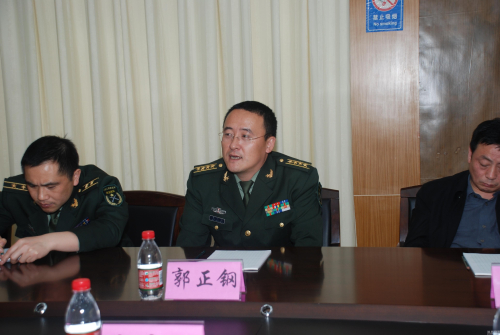|
 |
|
LATEST MOVE: Guo Zhenggang, Deputy Political Commissar of the Zhejiang Provincial Military Command under the Nanjing Military Area Command of the Chinese People's Liberation Army, is probed on suspicion of illegal activities in early March (HUIZHOU.CN) |
An official with the CCDI said that the amount of corruption detected among SOE executives during inspection has showed how rampant the problem is and how urgent they need to carry out their work.
Liu Junhai, a professor at the Law School of Renmin University of China, said China is strengthening the anti-corruption campaign concerning SOEs in a bid to accelerate SOE reform, which has been progressing slowly.
Some officials and executives of SOEs, which monopolize power to allocate public resources, are taking all possible means to hold onto their power and resisting the set-up of a market-oriented system, he said.
Corruption and abuse of power in SOEs have raised operating costs, impaired the openness of the market, caused a huge loss of state assets, and hampered development of the firms.
In realization of the severe situation, the CCDI set the task of inspecting all major SOEs this year at its January plenary session, making combating SOE corruption one of the priorities for 2015.
Gao Bo, Deputy General Secretary of the Clean Government Studies Center under the Chinese Academy of Social Sciences, said the anti-corruption drive targeting SOE officials will help push forward China's ongoing, broader overhaul of these companies and the economy. This is particularly important as China is coping with the "new normal" of slower economic growth.
The military sphere
Meanwhile, the People's Liberation Army (PLA) of China also pledged to step up its extensive anti-corruption drive on January 30.
The management and supervision of middle and high-ranking officers should be highlighted, said a document released by the CPC Central Military Commission (CMC), adding that they should insist on zero tolerance stance. "There should never be any sanctuary for corrupt officers in the military."
Xi Jinping, General Secretary of the CPC Central Committee and CMC Chairman, said that corruption threatened the survival of the Party and called for serious reflection on the corruption case of Xu Caihou, former CMC Vice Chairman and by far the highest ranking military official currently being investigated and prosecuted.
In October last year, Xu confessed to accepting huge bribes and taking advantage of his position to assist the promotion of other people.
On January 29, the Ministry of Defense announced that anti-corruption inspections will target the armed force, including the PLA navy, air force, the Second Artillery Corps and the armed police.
Xu Qiliang, Vice Chairman of the CMC, said earlier that senior officers within the PLA would be among the key targets of the ongoing crackdown.
According to a PLA Daily report on January 29, more than 200 senior military officers have been reprimanded, demoted or removed from their posts after being exposed by military auditors.
A total of 4,024 officers with the rank of lieutenant colonel or above, including 82 generals, have been the subject of scrutiny by PLA auditors since January 2013, the newspaper said. Of these, 21 were removed from their posts, 144 were demoted and 77 reprimanded and asked to correct the problems that were discovered, the report said.
It added that another 61 officers were given poor evaluations because their units were found to be plagued with financial problems.
More than 820 such problems at 180 military units were uncovered by auditors, who focused on infrastructure construction projects and the development of major weapons.
Auditors also found 216 clues that led to suspected corruption or other misconduct. They reported these to PLA disciplinary inspectors or prosecutors, resulting in the formal investigation of more than 60 officers and internal punishment for nearly 160 service members.
The number of clues uncovered by PLA auditors last year was more than the total reported in the three decades before 2014.
Auditors prevented as much as 12.1 billion yuan ($1.97 billion) in military funds from being misused or wasted.
About 12 million yuan ($1.95 million) was distributed irregularly to officers as subsidies were recovered.
Nearly 19 billion yuan ($3.1 billion) was cut from construction projects and administrative spending, while a considerable proportion of the money saved was invested on improving training operations, the report said.
The newspaper quoted an unidentified military prosecutor as saying that more than 90 percent of criminal cases within the PLA are related to infrastructure construction, property development, equipment purchasing as well as personnel and fund management.
In early November last year, the CMC placed the PLA Auditing Office under its direct management. The office had been administered by the PLA General Logistics Department.
Last year, 15 high-ranking officers including former CMC Vice Chairman Xu and Gu Junshan, former deputy head of the PLA General Logistics Department, were placed under investigation on suspicion of corruption.
Gong Fangbin, a senior colonel and political education researcher at PLA National Defense University, said a powerful auditing system will help the PLA carry out its anti-graft efforts.
Hou Xiaohe, also a senior colonel and a strategy expert at the university, said corruption in the PLA is particularly harmful because it affects morale and combat capability.
| 